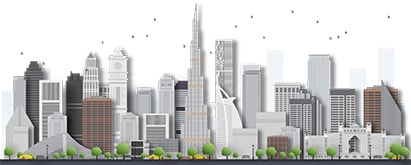Dubai World Central Freezone
 1. What law established this freezone?
1. What law established this freezone?
Dubai World Central (DWC) freezone was established under Dubai Law No. 8/2006, amended by Dubai Law No. 10/2015.
2. What are the main internal regulations governing this freezone?
DWC is regulated by the DWC Free Zone and Administration Rules and Regulations 2010.
3. Does this freezone have any reciprocal arrangements with other freezones?
Yes, the logistics corridor provides for unrestricted movement of freights between DWC Free Zone and the Jabel Ali Free Zone (JAFZA). Companies from both Free Zones can use the facilities provided by the Al Maktoum International Airport. Freight movement between the Dubai Airport Free Zone Authority (DAFZA) and DWC Free Zone is also permitted.
4. What are the key areas of UAE and Emirate legislation businesses operating in this Free Zone must still comply with? What are the most important examples of how this impacts operations?
When the DWC Free Zone and Administration Rules and Regulations 2010 are not applicable, UAE legislation applies. For example, Federal Law No. 2/2015, the Commercial Companies Law, will be applicable to areas not covered by DWC Free Zone regulations.
5. What are the key UAE and Emirate onshore agencies a business operating in this freezone would need to register or comply with?
The agency to be complied with depends on the activity a company undertakes. For example, an entity conducting business in the aviation sector must comply and register with the Civil Aviation Authority.
6. How does a company set up in this freezone?
Applicants seeking for lease of warehouse or development land are required to submit a business plan in the prescribed format and other requisite background information to the free zone department. On approval of this, the applicant can proceed to incorporation and registration process. The Authority generally reviews an application in 15 days of the date of its receipt.
However, in certain circumstances, a longer review period may be necessary.
7. What features do companies set up in this freezone have?
DWC freezone provides for 100 percent foreign ownership and does not restrict the capital return of income generated within the region. The reciprocal agreements between DWC freezone and other freezones provide for the unrestricted movement of freight between freezone areas.
Companies established in DWC freezone are exempt from tax liability (corporate and income tax) for 50 years from the date the company is registered.
8. What can companies set up in this freezone do?
Companies are permitted to undertake all legitimate business activities unless the DWC Authority expressly restricts it.
9. What can companies set up in this freezone not do?
A company is not permitted to carry out any activity not provided for under its license.
10. What types of business are allowed to operate in this freezone?
A company can conduct business in a wide range of industries, such as storage, logistics, transport, aerospace, etc.
11. What inheritance laws apply in this freezone?
The general inheritance laws of the UAE apply under Sharia law. However, Dubai Personal Law No. 28/2005, allows a non-Muslim to opt for the application of the laws of his home country for the dispersal of assets.
12. What taxation applies?
DWC companies are not liable to pay corporate or personal tax, or tax on the import or export of goods for a period of 50 years from the date the company was registered.
13. What accounting and auditing rules apply to businesses operating in this freezone?
Companies operating in DWC freezone have to comply with International Financial Reporting Standards.
14. Where do businesses operating in this freezone generally locate their bank accounts?
Companies conducting business in DWC are allowed to choose any bank account in the UAE.
15. Are there any specific rules governing when moveable property in removed from the freezone area or transferred into the freezone area from another jurisdiction?
 Dubai Customs regulations and Dubai and Federal law are applicable when movable property is removed from, or transferred to, DWC freezone. If property imported into the region from abroad is moved out of the area, customs duty has to be paid.
Dubai Customs regulations and Dubai and Federal law are applicable when movable property is removed from, or transferred to, DWC freezone. If property imported into the region from abroad is moved out of the area, customs duty has to be paid.
However, no duty will be due for the transfer of movable property between DWC freezone and the DAFZA or JAFZA region.
16. Are any specific licenses required to operate as a specific type of company in this freezone?
An educational license, general trading license, industrial license, logistics license and service license are all issued by the DWC Authority.
17. Is there any specific ongoing regulation or monitoring of firms operating as particular types of company by this freezone authority?
The monitoring authority depends on the company activity. For example, the Civil Aviation Authority monitors aviation industry activities.
18. How are disputes settled with companies in this freezone?
Disputes arising in DWC freezone are settled through the normal judicial avenue applicable in the UAE (the Courts of Dubai).
However, if a company expressly states the preferred forum in a contractual agreement, the alternate method will be applicable.
19. How are disputes between onshore companies and companies in this freezone settled?
Disputes arising between a DWC company and an onshore company are settled through the normal judicial avenue applicable in the UAE (the Courts of Dubai). However, if a company expressly states the preferred forum in a contractual agreement, the alternate method will be applicable.
20. What are the main rights and duties of an employer and employee working in this freezone?
The relationship between an employer and employee in DWC will be governed by Federal Law No. 8/1980, the UAE Labour Law.
21. How are employment disputes between employers and employees working in this freezone settled?
If a dispute arises between an employer and employee, the employee is required to file a complaint with the DWC Authority.On receiving a complaint, the DWC Authority will try to mediate between the parties. If the parties fail to settle the dispute, the matter will be referred to the Ministry of Labour.
The complaint must be in writing and contain a summary of the facts. It should also be accompanied by copies of the employee's labour card and employment contract.
The Ministry of Labour will attempt to settle the matter amicably, however, if the parties fail to come to a settlement, the Ministry of Labour will send an application to the Dubai Courts.
22. What entry qualifications and permits are required for staff working in this freezone?
The DWC freezone licensing department assists in obtaining the required permits and will stipulate staff entry qualifications depending on the proposed position.
23. How are staff working within this freezone registered with the authorities?
The DWC freezone licensing department assists staff with the registration process.
24. What rules govern the remuneration and minimum benefits of staff working in this freezone?
Federal Law No. 8/1980, the UAE Labour Law, governs the minimum benefits and remuneration of staff employed in DWC freezone.
25. What rules govern the working time and leave of staff working in this freezone?
Federal Law No. 8/1980, the UAE Labour Law, also regulates the working hours and leave of DWC employees. Companies are required to set rules on working hours, disciplinary procedures, grievances and the health and safety of workers.
26. What are the main features of a property lease in this freezone?
The DWC rules and regulations do not specify any features of a property lease.
27. Is it possible to apply for a building permit in this freezone? How is this done and what steps are required?
A building permit can be obtained from the DWC Authority, the sole authority authorised to do so. It deals with all matters relating to building such as development, construction and land planning. However, utilities must be provided by a utility provider.
To acquire a building permit in the DWC freezone, a company has to submit an application to the DWC Land Planning and Development Department.
28. What environmental requirements must construction companies building in this freezone consider, e.g. form of building, landscaping or building height?
Construction companies are required to comply with the DWC Building Regulations for Aviation, Logistics and Residential districts.
Therefore the environmental requirements will depend on the industry. For example, the Aviation District has to comply with Civil Aviation Authority regulations.
29. What are the key restrictions when leasing a property in this freezone?
The DWC Authority does not set any restrictions when leasing a property.
 30. What are the rules governing the use of utilities in this freezone?
30. What are the rules governing the use of utilities in this freezone?
Utilities in DWC are charged based on actual usage. However, this is subject to the relevant utility provider.
31. How do retail premises establish themselves in this freezone?
There are no specific restrictions on retail premises. However, their operation is subject to approval from the relevant authorities.
32. Is it possible for hotels to operate in this freezone - how do they establish themselves?
There are no specific restrictions on hotel activities. However, their operation is subject to approval from the relevant authorities.
Originally published on LexisNexis
 English
English
 عربي
عربي Русский
Русский 官话
官话 português
português
 Türk
Türk 




